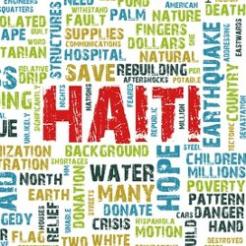One year on from the Haiti earthquake the rate of regeneration is slow, but Andrew Chaggar writes from the frontline that the building blocks can only be built by a stable government.
Last week Haiti marked the first anniversary of a devastating earthquake. One year on, as people reflect on those events, there had been criticism of both the Haitian government and the international community in regards to the lack of progress made in permanent reconstruction.
While the number of survivors living in camps was reported to have fallen by around 240,000 between last November and the anniversary, the painfully slow progress of permanent reconstruction means that many of those who left may have simply moved their tents to smaller alternative sites, or at best, into slightly sturdier transitional shelters.
Many people are obviously keen to know why so few survivors have been provided with permanent housing a full year after the disaster, particularly when so much money was donated to Haiti.
While the amount of funding available is important, it is not the most critical challenge to permanent construction. Land rights are often overlooked, but they are central to the struggle for permanent shelter and, as a result, to the construction of other vital facilities.
Rebuilding depends on land rights
When we talk about land rights, we mean whether or not people have the legal rights to the land where they live. After a disaster, when populations are displaced, land rights are the difference between moving to secure housing, or continuing to live as a squatter.
The poor, who are most affected by disasters, are often forced to live in poorly maintained rented accommodation without proper documentation or legal protection.
Even those who lived on their own land prior to disaster often didn’t obtain formal deeds and registration due to the cost and complexity of the legal process. The same may also be true of landlords who rent to others. This is particularly problematic in Haiti, as even before the earthquake only five percent of properties in Haiti were registered and the land tenure process was exceedingly complex.
To make the situation even more difficult, when a disaster strikes documents are often destroyed, along with property demarcations, leaving chaos and confusion in regards to who owns what land. As a result NGOs are often wary of building permanent shelter in case they make a wrong decision which would leave beneficiaries homeless again and donors disgruntled.
The problem of land rights is not special to Haiti. In fact, it is a recurring problem in disaster zones worldwide, including in the aftermath of the 2004 Asian Tsunami. As Ian Christoplos noted in 2006 when writing for the Tsunami Evaluation Coalition after that disaster:
"[Those] rebuilding schools, clinics, roads and other infrastructure need to know where the students, patients and travellers are going to live. Uncertainties about housing plans have profound knock-on effects for a variety of aspects of recovery programming related to public services and other infrastructure... the problem is rather that, for a disaster-affected person, the house is the hub in a wheel of
recovery with many broken and missing spokes."
"If you don't know where people will live, how can you know where to build infrastructure?"
The same is true in Haiti. Finding land for houses is critical not only for shelter but for the subsequent construction of schools and medical facilities. The problem is simple: If you don’t know where people will live, how can you know where to build infrastructure? This means that land-rights have a profound effect on the rest of Haiti’s recovery.
There is a lot of unused land available in Haiti but most of this is owned by the state or rich individuals - land reform was a pressing issue before the earthquake. Christoplos also noted the same issue after the tsunami:
"Land reform is a complex and political task that is not likely to be effectively managed by the humanitarian community.....It is not neutral, since the decisions required regarding property rights, land use planning and access to natural resources are by nature part of political processes at national and local levels."
So, experience shows us that without a strong political effort to resolve the issues surrounding land rights, little progress can be made.
In Haiti, that means that at least until the current uncertainty around the Haitian elections is resolved there is little chance that permanent reconstruction will move forward effectively. Even once a stable government is appointed there will need to be a concerted will to tackle land rights issues.
Until this happens NGOs are likely to continue rebuilding in a transitional manner that will suffice for the next five to ten years but still leave the average Haitian’s long term prospects in doubt.
Andrew Chaggar is executive director of European Disaster Volunteers which he co-founded in 2008, and is a 2010 Vodafone Foundation World of Difference International winner.









